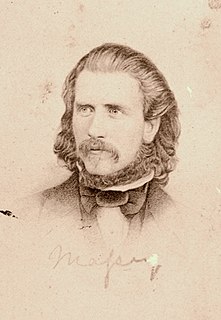A Quote by Robert Andrews Millikan
Two erroneous impressions ... seem to be current among certain groups of uninformed persons. The first is that religion today stands for mediaeval theology; the second that science is materialistic and irreligious.
Related Quotes
I firmly believe that the method which sets theological theories against scientifically ascertained facts, is fatal to the current theology and injurious to the spirit of religion; and that the method which frankly recognizes the facts of life, and appreciates the spirit of the scientists whose patient and assiduous endeavor has brought those facts to light, will commend the spirit of religion to the new generation, and will benefit--not impair--theology as a science, by compelling its reconstruction.
The antagonism between science and religion, about which we hear so much, appears to me to be purely factitiousfabricated, on the one hand, by short-sighted religious people who confound a certain branch of science, theology, with religion; and, on the other, by equally short-sighted scientific people who forget that science takes for its province only that which is susceptible of clear intellectual comprehension; and that, outside the boundaries of that province, they must be content with imagination, with hope, and with ignorance
First impressions of mediaeval life are usually coloured by the courtly romances of Malory and his later refiners. Chaucer brings us down to reality, but his people belong to a prosperous middle-class world, on holiday and in holiday mood. Piers Plowman stands alone as a revelation of the ignorance and misery of the lower classes, whose multiplied grievances came to a head in the Peasants' Revolt of 1381.
As the twentieth century began, science equaled a materialistic worldview. As the twenty-first century began, the worldview of science, at least of physics and astronomy, may have traded place with that of religion. Consider Einstein's famous equation E = mc2. Nothing of matter dies but continues on in another form, elsewhere. The church divines and theologians for two thousand years have devised arguments and "proofs" of immortality but nothing equal to this.
The essence of science is that it is always willing to abandon a given idea, however fundamental it may seem to be, for a better one; the essence of theology is that it holds its truths to be eternal and immutable. To be sure, theology is always yielding a little to the progress of knowledge, and only a Holy Roller in the mountains of Tennessee would dare to preach today what the popes preached in the Thirteenth Century, but this yielding is always done grudgingly, and thus lingers a good while behind the event.



































